Most modern games take some influence from existing games, but Empire’s End seems to really embrace this. I certainly don’t think it is a bad thing, as long as there are some enjoyable, original mechanics mixed in as well.
Components
The rulebook is clear and concise. I never needed to look online to answer a rules question I had. There is a lot of iconography used on the cards and it is all clearly described in the rules. Throughout the rules are historical quotes to get you into the theme of the game, should you be into that.
The overall artwork is gorgeous and highly detailed. The resource tokens are of good quality and thickness, if a little plain. The location tiles are very good quality with some glossy flames on the back. The cards are easy to shuffle. All the components are very readable, although you may need to reference the icons during your first game.
My one component complaint is a design decision. All destroyed sides of all the locations display fiery orange and red colors. The healthy sides all show green, yellows, and browns. Except for the two military locations which are orange and red. I continuously have to double check to see whether they are healthy or destroyed as the colors blend right together. Other players have independently had this same issue.
I’d also like to throw in my appreciation for appropriately sized boxes. Empire’s End’s box is perfectly sized for all of the components, making it nice and compact.
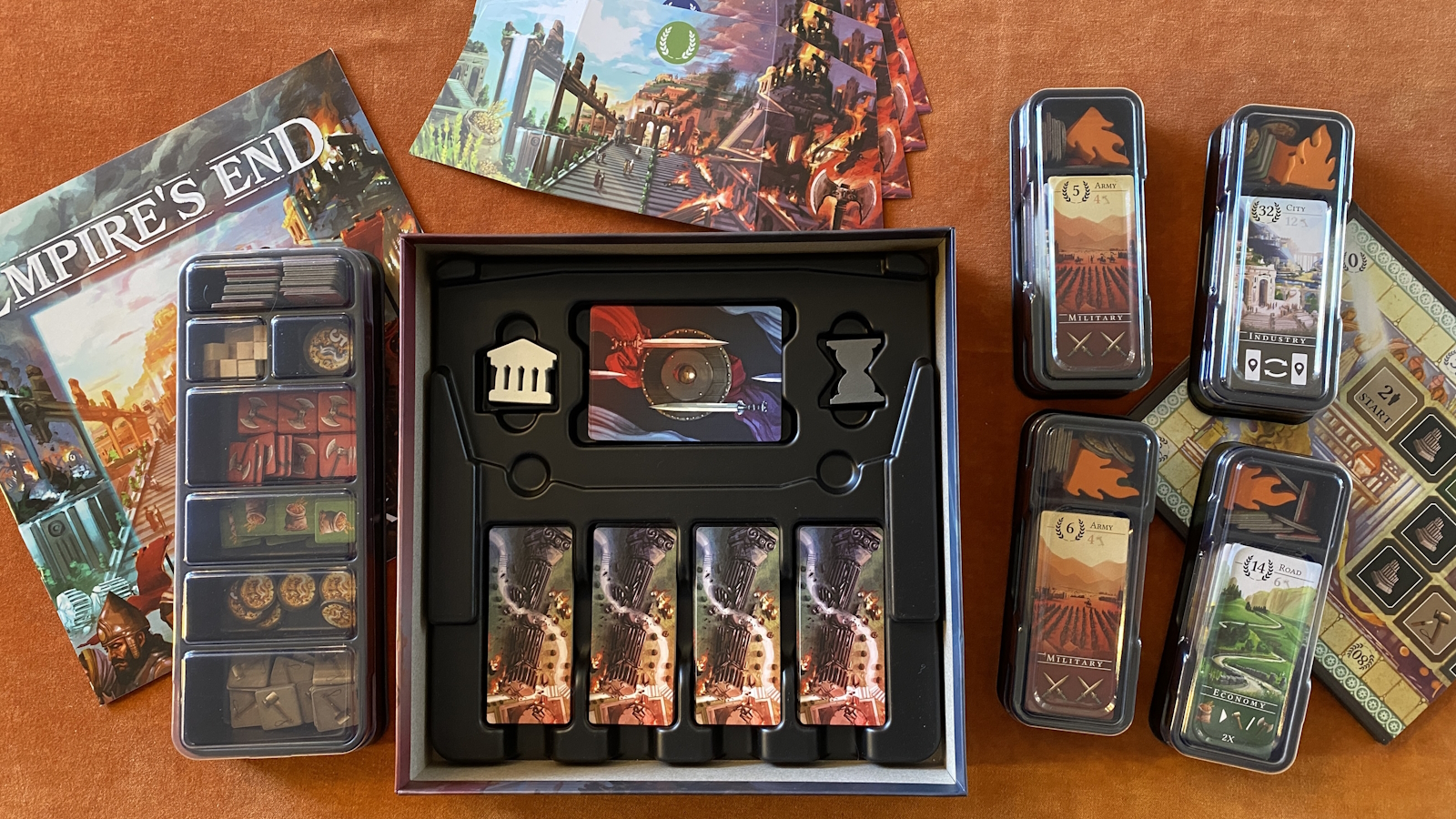
Everything fits in a nice little package.
Gameplay
Time for some comparisons! I generally don’t like filler games. However, one of my favorite filler games is No Thanks! The bidding mechanic of paying to not take a disaster is one of the core elements of Empire’s End, and it works great. Eventually someone takes the disaster, but they get all the resources that were bid. It is spiced up with the need to use specific resources depending on the disaster you are trying to avoid.
Another of my favorite lighter games is Libertalia. I really enjoy how each game is different due to the selection of pirates being randomized, but then synchronized between the players. Empire’s End has a similar setup of randomizing and synchronizing the order of the locations. However, as the game goes on players will end up with very unique layouts.
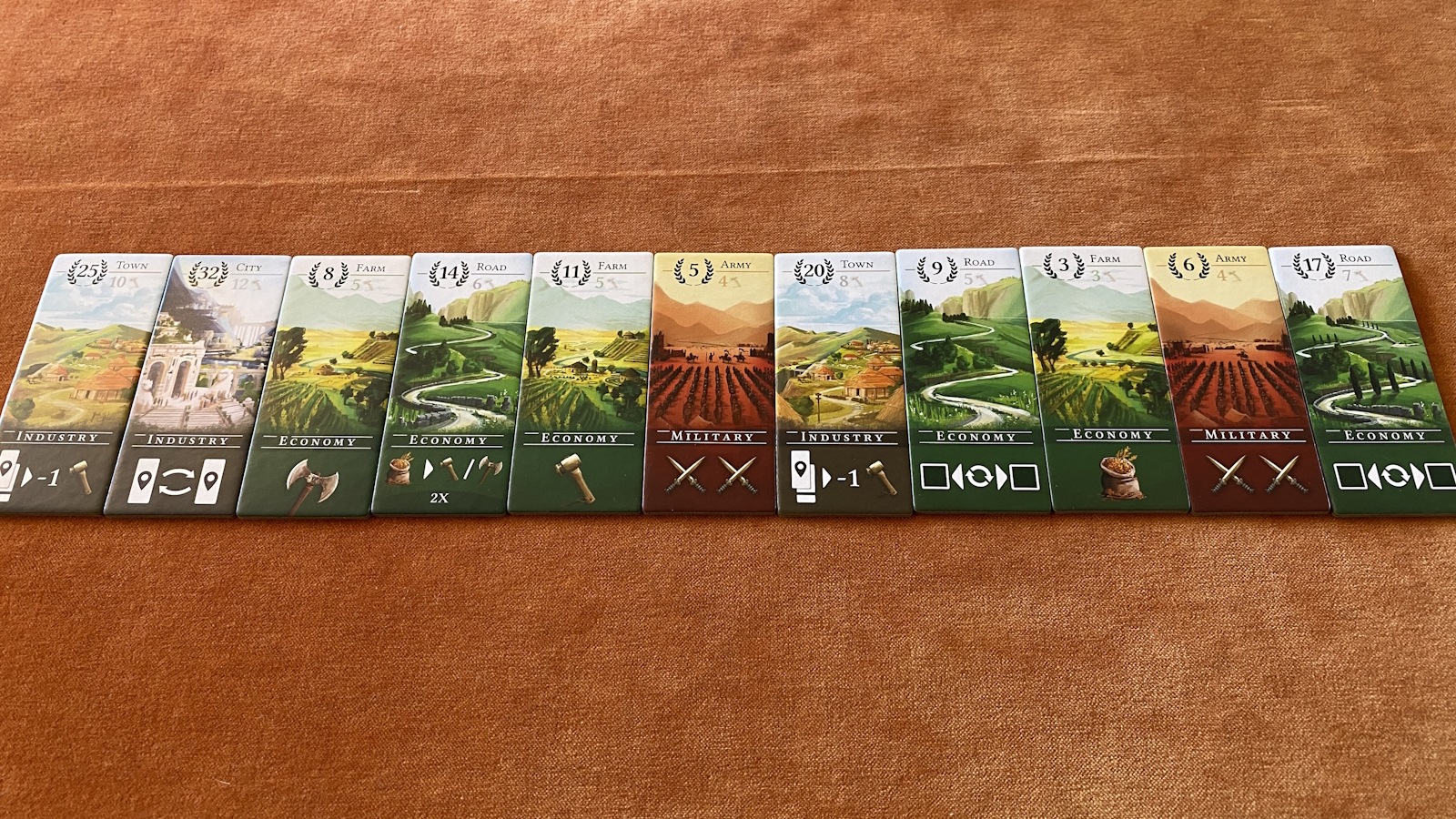
Players will all begin with the same setup.
And yet another of my favorite games for comparison is In the Year of the Dragon. I love difficult games, and like that one, Empire’s End is all about surviving as best you can until the end. The disasters will be brutal and there is no way to avoid them all. But if you can best manage which ones you take and which you avoid, you just might have the most points at the end.
There are four different types of turns. Disasters, Economy, Industry, and Military. Thematically this feels like a civilization game, even though many aspects are somewhat abstract. Disasters are the majority of the game, where you will spend your resources trying to save your locations, or take other player’s bids in exchange for watching your precious lands burn. Economy can get you more resources, but it is generally very minor. Industry lets you build your own improvements and perhaps do a very expensive repair.
Military has some semi-direct competition between the players. It uses a blind bid like that used in games such as Modern Art. Everyone will get a reward or penalty based on their military strength. The strongest player gets a bonus, while everyone else will have to move around one of their locations. Locations being out of sync between the players can really affect the bidding during disaster rounds.
As I have gotten older and less patient I have really come to enjoy games with simultaneous play. Three of the four types of rounds in the game are played simultaneously. The one round that isn’t is a quick moving bid. There is very little downtime in the game and I really enjoy that.
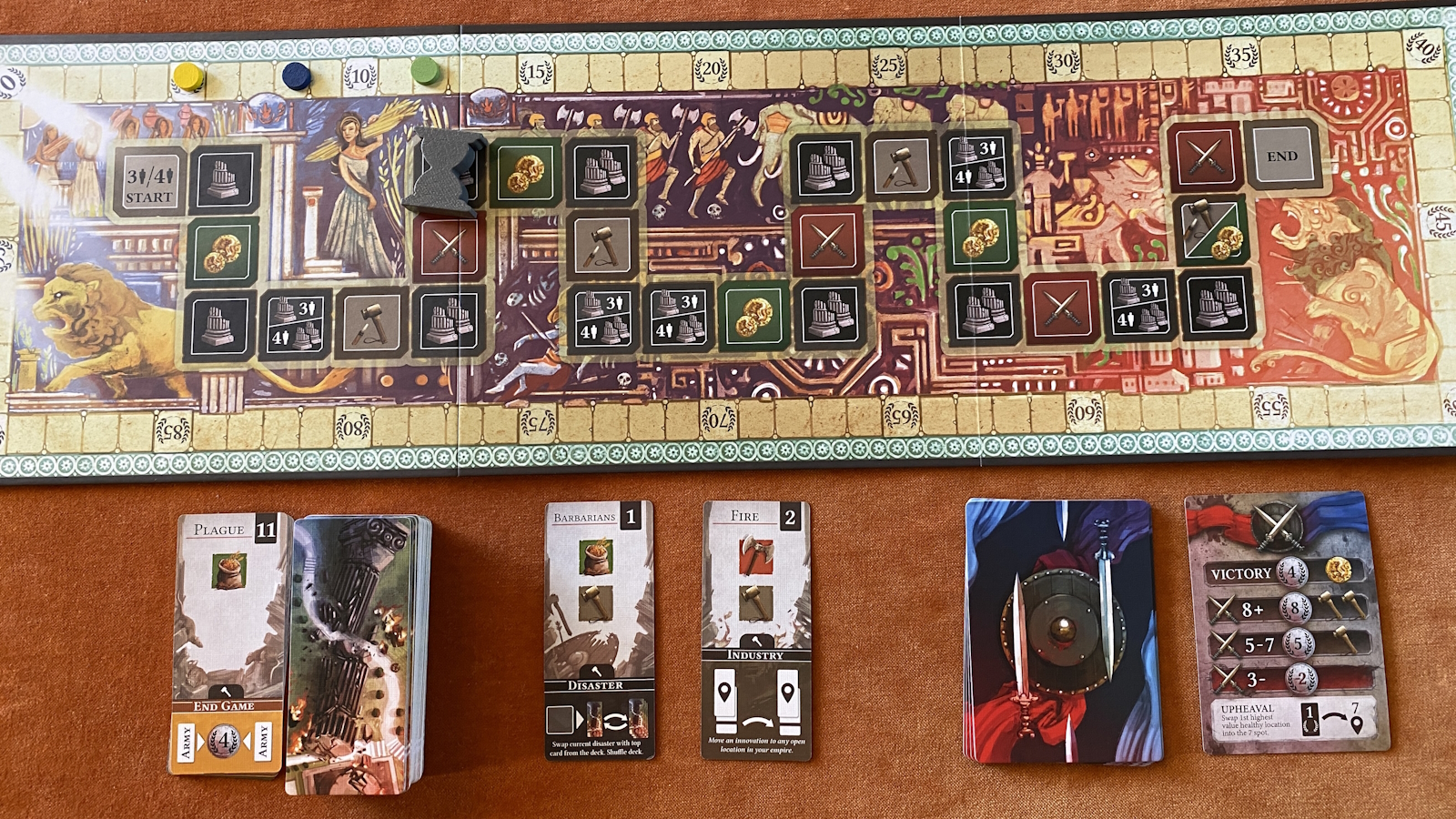
The main board guides players through all the rounds of the game.
Randomness
There is a lot of randomness in the game. At the beginning, all players are equal. The game will play out very differently whether economic locations are hit by early disasters or if everyone is fighting for the life of their extremely valuable city. The innovations that come with claiming a disaster can vary wildly, going from practically useless to rare and valuable end game scoring. Correctly valuing these and playing around other players is a great part of the game. You might actually want to take a disaster, but you’d like to get as many resources from other players as you can at the same time. Knowing when you can send the bid around again is important.
However, players are also dealt their own private innovations to build during industry rounds. These have the potential to be very swingy. Some end game scoring innovations, if played right, can be worth a ton of points. I have won games with the help of just the right innovations being dealt to me. A large portion of each player’s score isn’t revealed until the very end, making it difficult to tell who is winning before the game is over.
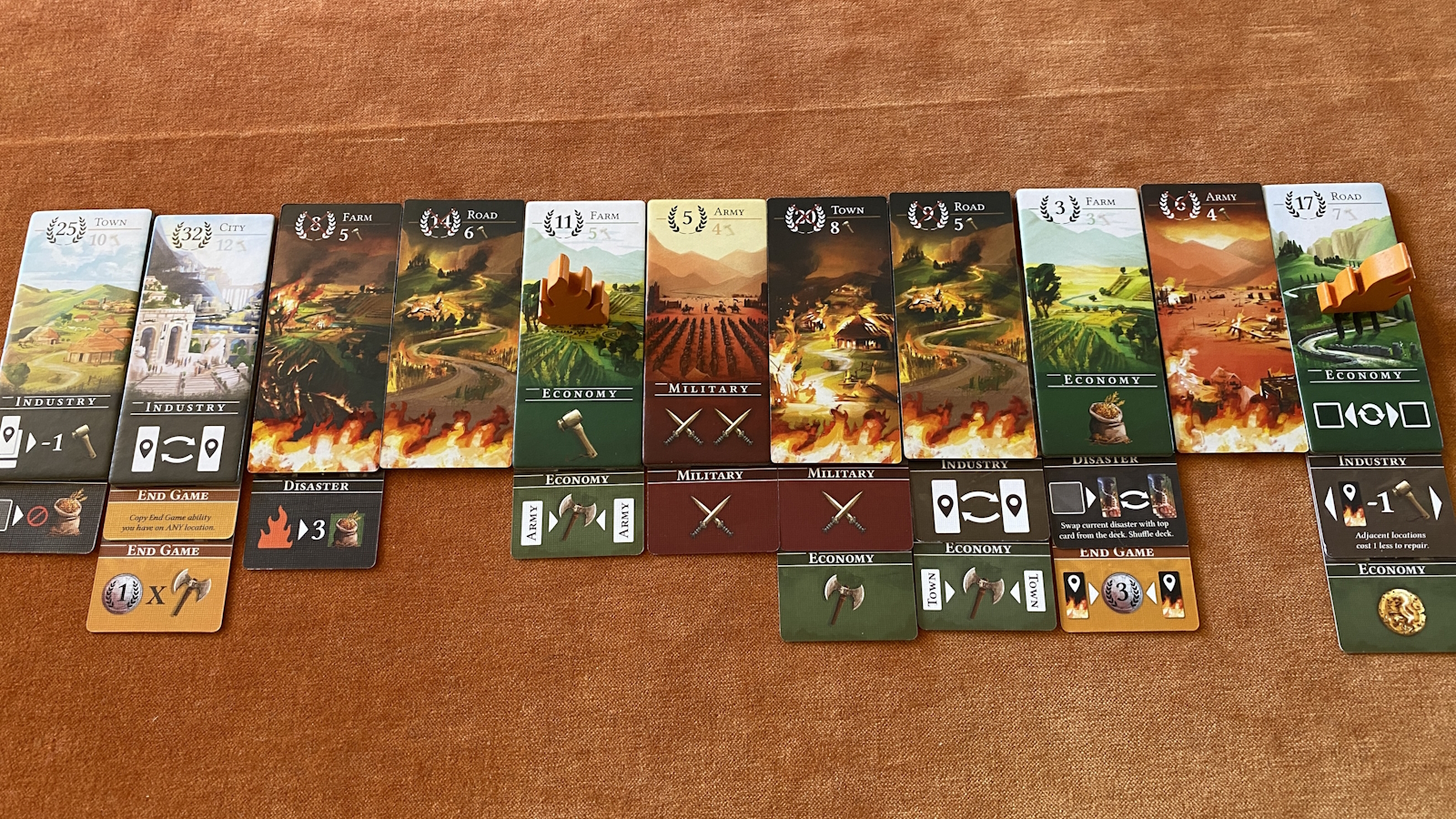
By mid game, everyone’s board will be in some sort of disarray.
Player Scaling
The game is great with three or four players. There is always tension during the disaster rounds and competition during the military rounds. Trying to roughly keep track of how many resources each other player has compared to you is fun. Bidding for two disasters at once can make those rounds even more interesting.
With two players, however, it is a very different game. Every loss you have is a direct gain by your only opponent. It becomes a high stakes game of chess. But, there is so much randomness that it ends up feeling more like a game of luck than skill. I did not enjoy Empire’s End with this player count. If you do enjoy this sort of random head to head experience, it plays very quickly.
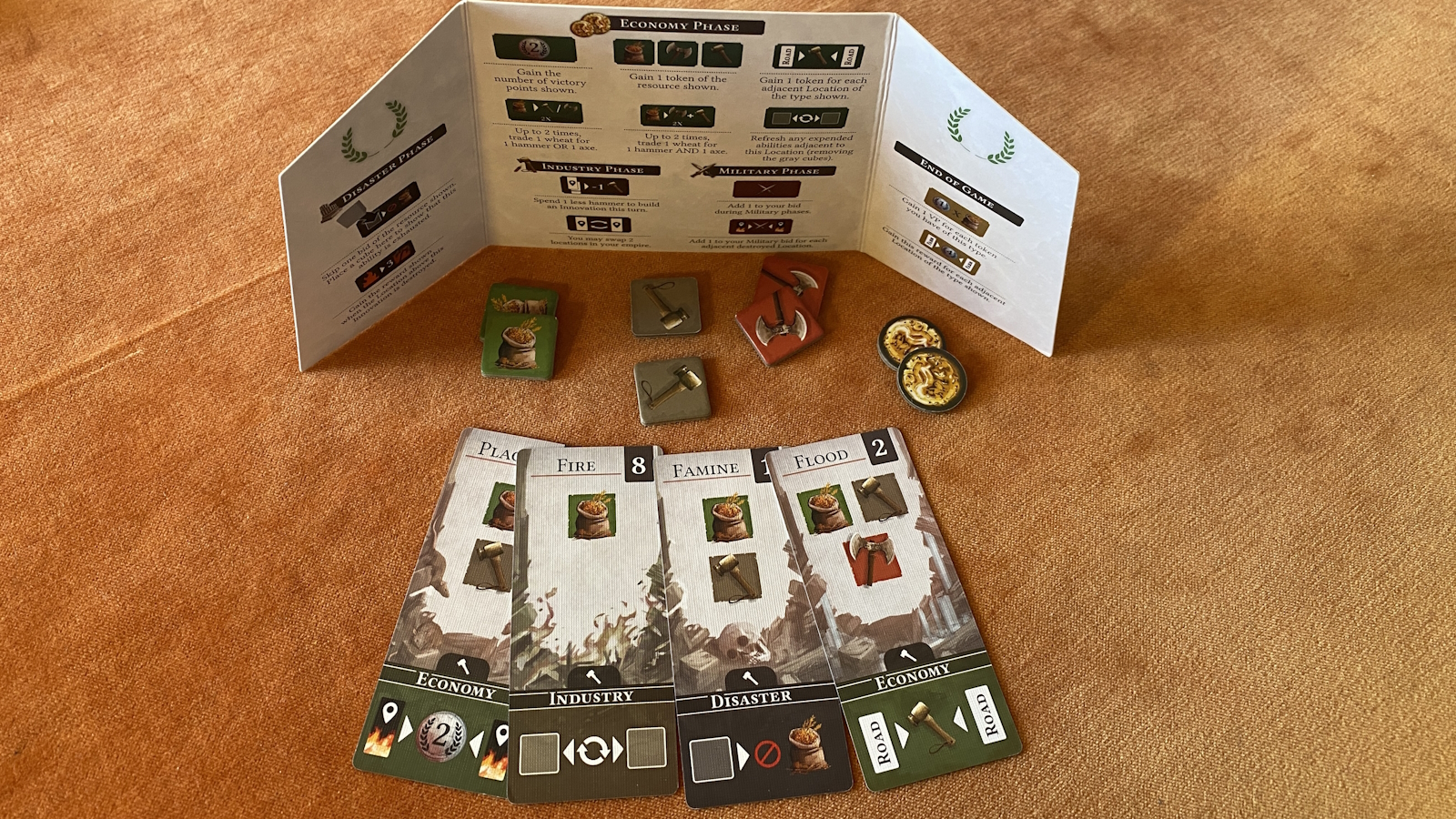
Innovations you are dealt can have a huge impact on your performance.
Conclusion
Empire’s End is what I like to call a “medium weight filler game.” There is randomness from the decks and setup to make each play unique and enjoyable. There are enough meaningful decisions that I feel like I’m playing a game and not just waiting for the next one. And yet, it plays quite quickly, only taking from 45 to 90 minutes.
















